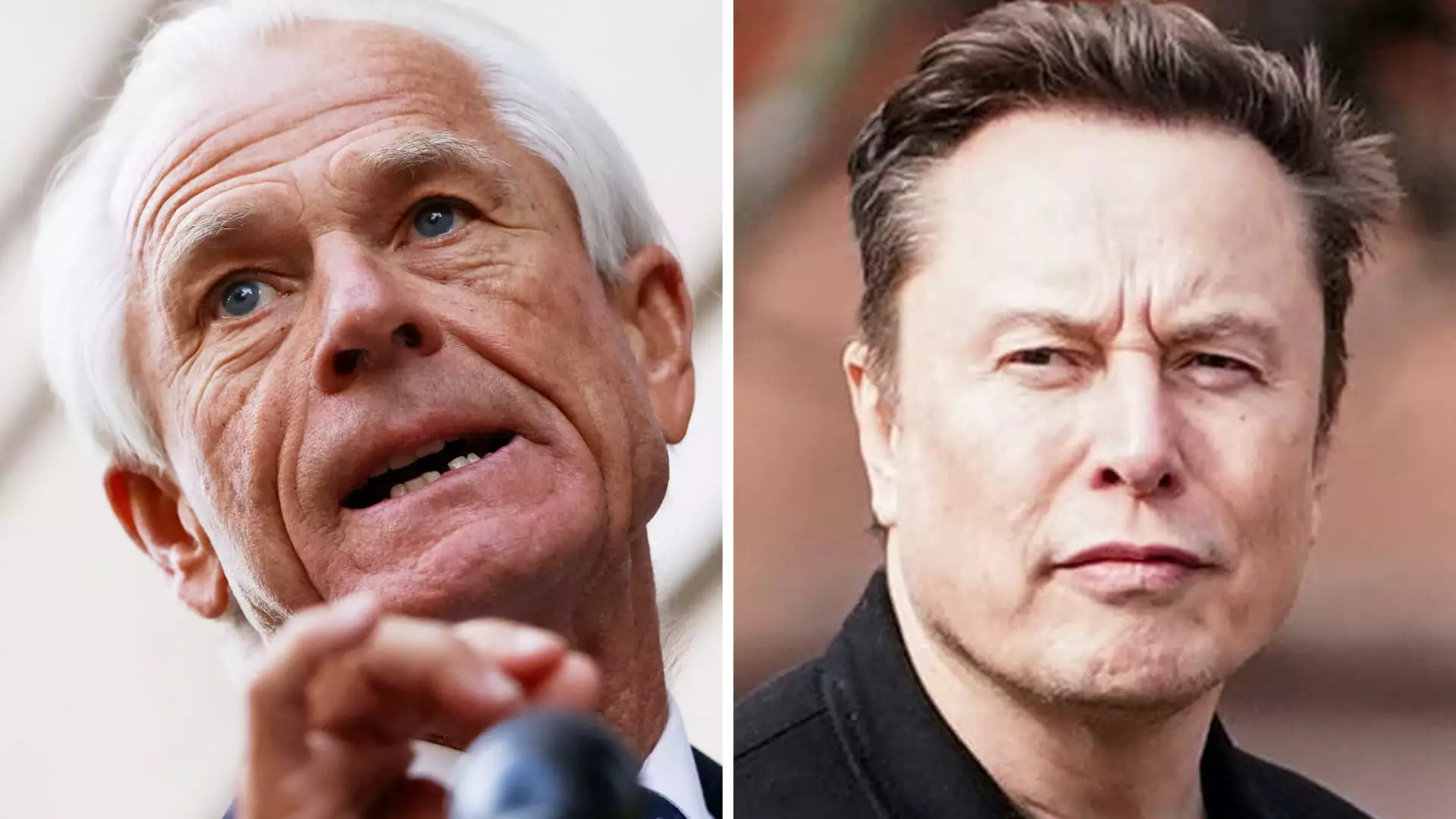The political landscape in the United States has often been characterized by a clash of egos and ideologies, and nowhere is this more apparent than in the tumultuous relationship between Peter Navarro, a top trade adviser, and Elon Musk, the billionaire tech entrepreneur. The recent exchange between these two men underscores a broader, more concerning issue: the tendency for influential figures in the Trump administration to engage in ideological sparring which ultimately muddles coherent policy-making. Navarro’s immoderate rhetoric, contrasting with Musk’s more progressive stances, reveals a deeply entrenched divide that could stymie economic growth and innovation.
What stands out is not merely the insult Musk directed at Navarro, calling him a “moron,” but also the underlying implication that Navarro’s traditionalist views on manufacturing and tariffs are increasingly out of step with contemporary business practices. The staunchly protectionist policies espoused by Navarro aim to resurrect American manufacturing at all costs, even if it inadvertently hampers technological advancement in a globalized economy. Musk’s rebuttal—that Tesla produces the most American-made cars—highlights the complexity and nuance often lost in simplistic narratives about “American-made” versus “foreign-made.”
Manufacturing Myths and Reality
Navarro’s insistence that the U.S. must reclaim all stages of manufacturing ignores the intricacies of contemporary supply chains. While he romanticizes the idea of tires made in Akron and engines crafted in Flint, the reality is that no nation operates in a vacuum. Global trade agreements and international supply networks foster an interdependence that has transformative potential for innovation and consumer choice. Navarro’s dichotomy—where one side embodies “American manufacturing” and the other “foreign outsourcing”—is not only reductive; it is dangerously out of touch with the flexible nature of modern industry.
What’s particularly disturbing is the implication that Musk, despite his pivotal role in shaping the future of electric vehicles, is simply a “car assembler.” This dismissive viewpoint undermines the transformative potential of technological innovation, relegating important conversations on the future of manufacturing to the realm of petty insults. While Navarro throws around terms like “American-made,” Musk advocates for a vision that integrates domestic production with global collaboration. Musk’s approach, which includes advocating for lower tariffs to facilitate trade between the U.S. and Europe, seems to align more with the principles of a global economy that values competitiveness and innovation.
The Politics of Waste: A Weaponized Agenda
Navarro’s praise for Musk’s work on the Department of Government Efficiency is equally perplexing. Decrying waste in government while supporting initiatives that lead to mass layoffs paints a troubling picture of a narrow-focused liberality. Disregarding the human element—real lives lost and families displaced—under the banner of combating “waste, fraud, and abuse” lacks moral rigor. While there’s a valid argument to be made about inefficiencies in government, the execution of these ideas must not come at the expense of the social fabric.
The broader implication of this ideological disarray is that the Trump administration’s economic strategy appears riddled with contradictions. A call for reduced tariffs juxtaposed with the advocacy for protectionist measures illustrates a pathological inconsistency that leaves businesses and citizens confused. The uncertainty fostered by such discord can stifle investment and innovation at a time when strategic foresight and coherent economic policy are more essential than ever.
The Dangers of Ideological Rifts
These ideological rifts among members of the Trump administration not only erode trust and cohesion but also risk solidifying a regressive economic paradigm. The insistence on outdated manufacturing practices over forward-thinking solutions could lead to stagnation as technology races ahead. Navarro’s combative posturing stands in stark contrast to the necessity for collaboration and dialogue—essential aspects for thriving in the evolving landscape of the modern economy.
The shifting dynamics between key players like Navarro and Musk reveal profound implications for American society; in a time of rapid change and uncertainty, the polarization of ideas serves to distract from the meaningful progress that is necessary to address pressing economic challenges. True leadership should focus on fostering dialogue, bridging divides, and encouraging innovation instead of reserving energy for petty insults and ideological grandstanding.
The crossroads at which we find ourselves demands attention, as the confluence of technology, globalization, and economic policy will define the future of this nation. The question remains whether our leaders can transcend their egos to embrace a future that honors the complexity of our interconnected world, rather than clinging to outdated notions of supremacy and isolation.


Leave a Reply